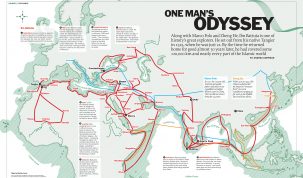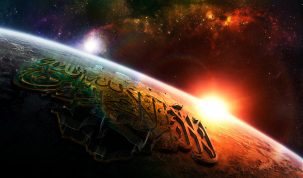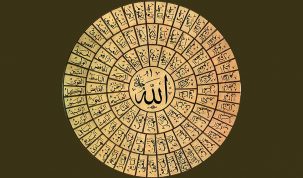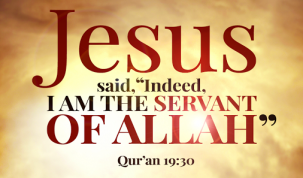Islam, sa ika sampung siglo, ay ang pangunahing relihiyon, o kaya, ang relihiyon ng karamihan sa mga nasyon sa lugar na sakop ang higit sa kalahating sibilisadong mundo na umabot lagpas sa tatlong kontinente mula sa Pyrenees at Siberia sa Kanluran at Hilagang Europe hanggang sa pinakahuling duli ng Asya, hanggang sa Tsina at New Guinea sa Silangan; mula sa Morocco sa Hilagang Africa hanggang sa katimogang dulo ng Africa, na umabot sa 2/3 sa Kuntinente ng Africa. Ito ay isa sa mga kapansin-pansin na katotohanan ng kasaysayan ng tao na ang paglaganap ng Islam sa napakalawak na lugar na ito ay nangyari lamang sa loob ng tatlong siglo. Ang higit sa kapansin-pansin sa lahat, sa loon ng kalahating siglo pagkatapos ng Hijrah (Ang pag-mirgate ni Propeta Muhammaf mula sa Makkah hanggang sa Madina), ang Islam ay nasakop na ang buong Hilagang Africa mula sa Ehipto hanggang sa Morocco, ang lahat ng mga lupain sa Gitnang Silangan mula sa Yemen hanggang sa Caucasia at mula sa Ehipto hanggang sa lupain lagpas sa Transoxiana (bahagi ng Gitnang Asya na sa ngayon ay ang Uzbekistan at ang Timog-Kanlurang Kazakhstan). Sa panahon ng pamumuno ng pangatlong Khalifa na si Uthman, naway kalugdan siya ni Allah, Â na ang mga sugong Muslim ay nakarating sa Palasyo ng mga Instik, kung saan sila ay malugod na tinanggap, isang mahalagang pangyayari, ayon sa mga mananalaysay, ang simula ng pagpasok ng Islam sa bansang ito. Mayroong maraming mga dahilan kung bakit ang mga nasyon, mula sa nakaraan hanggang sa ngayon, ay handang yumakap sa Islam, ang itinuro ni Muhammad Asad, isang hudyong yumakap sa Islam, marahil ang pinakapangunahin:
Ang Islam ay mistulang isang perpektong gawang arkitekto.
Ang Islam ay mistulang isang perpektong gawang arkitekto para sa akin. Ang lahat ng bahagi nito ay nagkakatugmang pinupuno at sinusuportahan ang bawat isa, walang anumang pagkukulang, na may resulta sa isang sakdal na balanse at matibay na kahinahunan. Ang lahat sa katuruan at panuntunan ng Islam ay nasa tamang lugar.(Islam at the Crossroads, p.5)
Ang Islam ay ipinalaganap sa pwersa ng espada
Karamihan sa mga kanluraning manunulat, higit lalo sa napapasailalim ng impluwensiya ng simbahan, ay hindi nabigo sa pagakusa sa Islam sa pagpapalaganap sa pamamagitan ng pwersa ng espada. Ang sanhi ng paninirang ito ay dahil sa katotohanang ang paglaganap ng Islam ay malimit na nangyayari na nakapipinsala sa Kristiyanismo. Habang ang Islam ay nakakuha, sa ilang mga siglo, ng maraming mga nagbalik loob mula sa Kristiyanidad ng walang kahirap-hirap o kaya sa pagbubuo ng mga organisadong gawaing misyonero, ang Kristiyanismo ay halos hindi makakuha ng mga kombertido mula sa Islam kahit pa sa sopistikadong paraan at napaka-organisadong mga gawaing misyonero, at ito ay palaging nasa katalunan sa pakikipag kompitensiya nito sa Islam sa labing apat na siglo. Ito ay naging sanhi sa mga misyonaryo nito at karamihan sa mga dalubhasa sa silangan o orientalists sa pagkakaroon ng hugnayan sa kanilang mga sarili sa paglarawan sa Islam at pagpapakilala nito bilang paurong, mahalay na relihiyon ng malulupit na tao. Ang katulad na paguugali ay malungkot na iniuugnay sa Banal na Propeta ng Islam. Ito ay malinaw mula sa mga pag amin ng iilan sa mga walang kinikilingang manunulat mula sa Kanluran. Ayon kay P. Bayle:
Ang mga Muslim, ayon sa prinsipyo ng kanilang pananampalataya, ay nasa ilalim ng isang obligasyon na gamitin ang pwersa para sa layunin na dalhin ang ibang relihiyon sa pagkawasak (marahil ang ibig niyang sabihin ay ang Jihaad na hindi para sa layuning kanyang minumungkahi); Ngunit, sa kabila nito, sila ay nagparaya sa ibang mga relihiyon sa iilang siglo nang nakaraan. Ang mga Kristiyano ay hindi binigyan ng utos na gumawa ng anoman maliban sa pangangaral at pagtuturo, ngunit, sa kabila nito, sa mga panahong hindi na abot ng gunita, kanilang nilipol gamit ang apoy at espada ang lahat ng hindi kabilang sa kanilang relihiyon
they have been exterminating by fire and sword all those who are not of their religion […] We may feel certain that if Western Christians, instead of the Saracens and the Turks, had won the dominion over Asia, there would be today not a trace left of the Greek Church, and that they would never have tolerated Muhammadanism as the ‘infidels’ have tolerated Christianity there. We (Christians) enjoy the fine advantage of being far better versed than others in the art of killing, bombarding and exterminating the Human Race.” (Bayle P., Dictionary, ‘the article Mahomed’, 1850)
To what is Islam indebted its unequaled spread?
Islam is indebted its unequaled spread to its religious content and values, which is confessed by all objective Western intellectuals:
Many have sought to answer the questions of why the triumph of Islam was so speedy and complete? Why have so many millions embraced the religion of Islam and scarcely a hundred ever recanted? Some have attempted to explain the first overwhelming success of Islam by the argument of the Sword. They forget Carlyle’s laconic reply. First get your sword. You must win men’s hearts before you can induce them to imperil their lives for you; and the first conquerors of Islam must have been made Muslims before they were made fighters on the Path of God. Others allege the low morality of the religion and the sensual paradise it promises as a sufficient cause for the zeal of its followers: but even were these admitted to the full, no religion has ever gained a lasting hold upon the souls of men by the force of its sensual permissions and fleshy promises…
In all these explanations the religion itself is left out of the question. Decidedly, Islam itself was the main cause for its triumph. Islam not only was at once accepted (by many peoples and races) by Arabia, Syria, Persia, Egypt, Northern Africa and Spain, at its first outburst; but, with the exception of Spain, it has never lost its vantage ground; it has been spreading ever since it came into being. Admitting the mixed causes that contributed to the rapidity of the first swift spread of Islam, they do not account for the duration of Islam. There must be something in the religion itself to explain its persistence and spread, and to account for its present hold over so large of a proportion of the dwellers on the earth… Islam has stirred an enthusiasm that has never been surpassed. Islam has had its martyrs, its self-tormentors, its recluses, who have renounced all that life offered and have accepted death with a smile for the sake of the faith that was in them. (Stanley Lane-Poole, Study in a Mosque, pp.86-89)
A. J. Arberry has also pointed out that the reason for the spread of Islam is Islam itself and its religious values. (Aspects of Islamic Civilization, p.12) He states:
The rapidity of the spread of Islam, noticeably through extensive provinces which had been long Christian, is a crucial fact of history […] The sublime rhetoric of the Quran, that inimitable symphony, the very sounds of which move men to tears and ecstasy”. (M. Pickhtal, The Meaning of the Glorious Quran, p.vii)
Arberry continues:
This, and the urgency of the simple message carried, holds the key to the mystery of one of the greatest cataclysms in the history of religion. When all military, political and economic factors have been exhausted, the religious impulse must still be recognized as the most vital and enduring.
Brockelman, who is usually very unsympathetic and partial, also recognizes the religious values of Islam as the main factor for the spread of Islam. (History of the Islamic Peoples, p.37) Rosenthal makes his point as follows:
The more important factor for the spread of Islam is religious law of Islam (Sharee’ah which is an inclusive, all-embracing, all-comprehensive way of thinking and living) which was designed to cover all manifestations of life. (Political Thought in Medieval Islam, p.21)





















